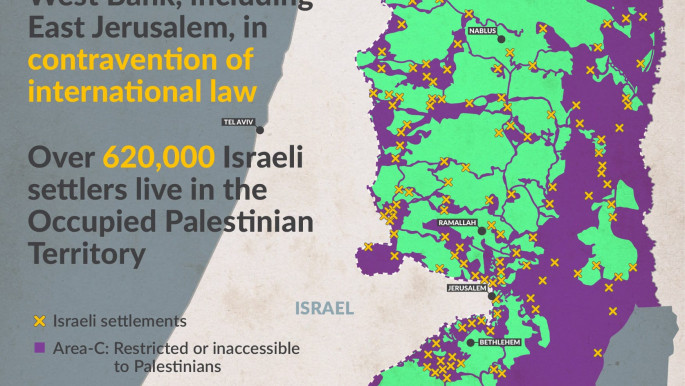Israeli settlements built on private Palestinian land ruled illegal
Eight out of the panel's nine judges voted to rescind the 2017 law, under which the settlers were permitted to remain on such land if they had been built "in good faith" without prior knowledge of Palestinian ownership, or if the government had ordered homes to be built there.
The law "unequally infringes on the property rights of Palestinian residents while giving preference to the proprietary interests of Israeli settlers", Chief Justice Esther Hayut wrote on behalf of the majority.
Rights groups have long argued that the law, which was suspended soon after it was passed due to the legal action against it, had retroactively legalised over 50 settler outposts constructed without government approval.
If approved, the law would have allowed the government to expropriate private Palestinian land where experts estimate 4,000 settler homes have been built illegally.
 |
|
| Click to enlarge |
The law also stipulated that Palestinian owners would receive 125 percent financial compensation for the land.
Prime Minister Benjamin Netanyahu’s right-wing Likud party described the ruling as "unfortunate", saying the law has been "important [...] for settlement activity and its future" and that it would work to overturn it.
However Likud's coalition partner Blue and White, said the law "runs counter to the constitutional situation in Israel, and its legal problems were known at the time of its approval".
"We respect the High Court’s ruling and (will) ensure it is implemented," Blue and White said.
Netanyahu has long pledged to annex Jewish settlements and the Jordan Valley in the West Bank, territory it has occupied since 1967, but with which Palestinians intend to establish their future state.
After being given the greenlight by the US, Israel's government will begin discussions on annexation on 1 July.
The Palestinians have unilaterally rejected US President Donald Trump’s peace plan, which allows for a Palestinian mini-state separated into isolated blocs of territory and with severely curtailed autonomy.
Follow us on Facebook, Twitter and Instagram to stay connected

![Palestinians mourned the victims of an Israeli strike on Deir al-Balah [Getty]](/sites/default/files/styles/image_684x385/public/2024-11/GettyImages-2182362043.jpg?h=199d8c1f&itok=xSHZFbmc)


![The law could be enforced against teachers without prior notice [Getty]](/sites/default/files/styles/image_684x385/public/2178740715.jpeg?h=a5f2f23a&itok=hnqrCS4x)
 Follow the Middle East's top stories in English at The New Arab on Google News
Follow the Middle East's top stories in English at The New Arab on Google News


![Left-wing candidate Jill Stein campaigns in Michigan in October [Getty]](/sites/default/files/styles/image_330x185/public/2024-11/GettyImages-2176828619.jpg?h=199d8c1f&itok=h2FXzBuP)